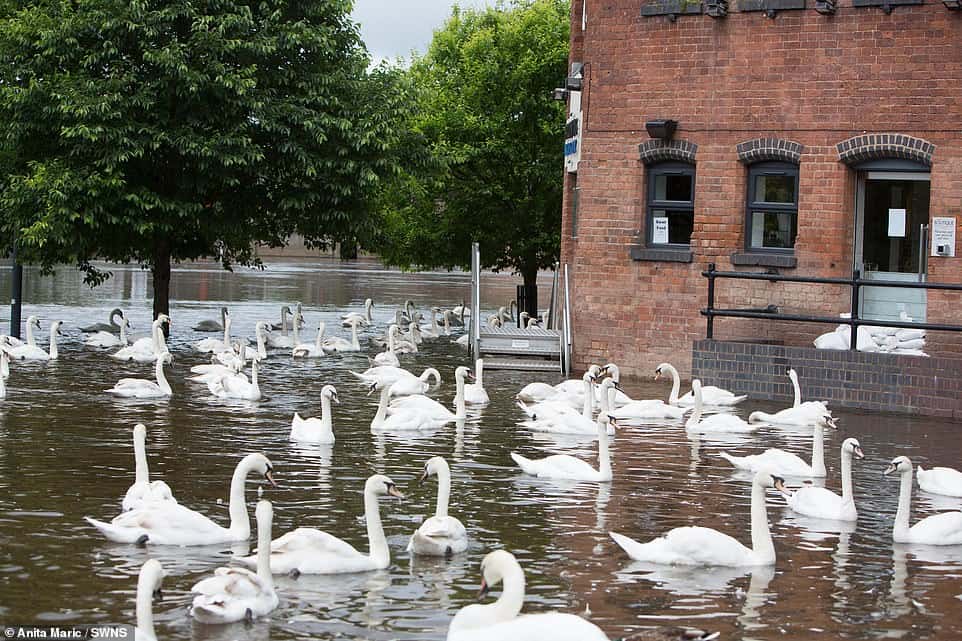It sounds like a dystopian sci-fi film: people too scared to speak or reach out to each other as flood waters pour through their communities and close in on their homes.
But it’s not a movie – it’s reality in the making. Recently, as flooding got so bad swans swam through Worcester city centre, the Government announced an amendment to its Public Order Bill, giving police powers to shut down protests before they’ve even started.
That means control not just of action, but of thought and speech. Making people scared even of getting together and talking about what’s possible. Crushing resistance at its root; cutting off the conversations and friendships that help it grow.
And while the government wants silence in the streets, judges are already imposing silence in the courtroom. In the on-going Insulate Britain trials, defendants aren’t allowed to talk about the context or personal motivation for their action. When one defendant, 80-year-old Rev Sue Parfitt, did so much as to mention ‘unprecedented times’, Judge Silas Reid told her this was off limits. He even sent out the jurors in case Sue’s words affected their verdict (they found her not guilty anyway).
It’s surreal. In most criminal trials, the ‘why’ is paramount. Understanding motivation is a crucial part of the process, during trials and in sentencing. For example, if you were accused of assaulting a child by pulling them roughly off the road, an essential part of your ‘why’ might be that they were about to be hit by a speeding truck. If you weren’t allowed to mention the truck, how would that be fair?
Yet that’s exactly what’s happening in the trials of people involved in protest and civil resistance today. Motive continues to play its part in other kinds of trials. People who have killed and raped are still allowed to talk about their ‘why’. But not people who have simply sat peacefully in a road for 30 minutes to stop the biggest violence ever done to humanity.
To show the scale of the injustice, there are currently over fifty civil resistance Crown Court trials making their way through the courts. So far not one judge has allowed the defence of necessity to be heard. In fact, in many cases no defence at all has been allowed. This means that, according to our justice system, the motives do not matter.
Imagine how strange it must be for these juries. They have to scrutinise the actions of ordinary, intelligent, reasonable people who apparently go out and disrupt traffic for no reason at all. Of course, they can read between the lines. What’s unsaid can be louder and more deafening than what’s spelled out. We all know about elephants in the room and the huge shadow they cast.
When out on bail, some people again face silencing. They’re told not to talk about protest even in a general way (which wouldn’t affect the outcome of their trial). They’ve also been stopped from associating with others involved in civil resistance: their friends, their social and moral sustenance.
What about independent journalists – surely they’re still free to tell the story? Not according to Hertfordshire Police, who arrested three journalists, Rich Felgate, Charlotte Lynch and Tom Bowles last November for reporting on a Just Stop Oil action. There was no mix-up: all three presented their press cards to the police and were still removed from the scene to spend hours in custody. If it sounds like something that could happen in Moscow, that’s because it is.
Silence on the streets, silence in the courtroom, silence in the media. This is the bleak vision the government has in store, unless we make a whole lot of noise now. Destroying civil resistance means destroying democracy itself, and that’s not an option at this time. There’s only so much loss the British people can take – the loss of our climate, the loss of our food security, the loss of our health service, the loss of our rivers and seas, the loss of our freedoms, and the loss of our voices – before the silence turns into a deafening clamour. There’s way too much at stake not to break the silence together. Will you join us?
🖋 Sign up for direct action at bit.ly/JSO2023
Support us at bit.ly/JSOdonate3
🌡 Learn more about the campaign at bit.ly/JSOevents
#FreeLouis #CivilResistance #A22Network #JustStopOil #NoNewOil #NoNewCoal #EnoughIsEnough #ClimateCrisis #ClimateChange #CostOfLivingCrisis #CostOfGreedCrisis #UK #Government #FossilFuels #CivilDisobedience

